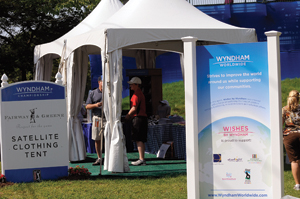The PGA Tour’s merchandise sales at tournaments are climbing their way back to pre-recession levels, and some growth is anticipated for 2011.
While the average amount of a transaction at a PGA Tour event merchandise tent is down, fans are making more transactions each weekend to drive the revenue numbers back up.
Merchandise sales typically account for 5 percent to 10 percent of a tournament’s gross revenue. Even at events where sales are on the low end of that range, merchandise is an important brand extension for the title sponsor.
 |
ANTHONY VINSON SMITH / WYNDHAM CHAMPIONSHIP
Sales for 2010 were back to pre-recession levels, and tents remain busy in 2011. |
Those sales trends do not include major championships, where merchandise sales are much more robust because of the stature of the tournaments and the fact that three of the four majors rotate sites, so each new event brings a unique mark.
For tournaments that annually return to the same site with — they hope — the same sponsor and the same logo, their challenge has been selling merchandise that might look and feel much like last year’s. How do you persuade fans to buy a golf shirt this year when they bought golf shirts the last year or two?
“I have noticed that tents are getting smaller,” said Steve Timms, director of the Shell Houston Open. “Everybody is looking for a more efficient model.”
Many events are responding with more apparel selection and a greater variety of price points.
Peter Kent, the tour’s vice president of championship management and business affairs, said the tour runs the merchandise for 15 tournaments, including most of the events on TPC courses such as the Zurich Classic and John Deere Classic, the WGC events, some FedEx Cup playoff tournaments, the Players Championship and the Northern Trust Open.
Sales data from his events show that merchandise revenue in 2010 was back to the pre-recession levels of 2008, and the 2011 numbers are projected to be up about 4 percent over 2010. Other tournament directors say their sales haven’t been quite that good and that it will take another year to rebound to pre-recession levels.
“It’s a much harder business than it was five to 10 years ago,” said Greg McLaughlin, a 25-year veteran of the tournament business and currently the CEO of the Tiger Woods Foundation, which runs the AT&T National. “You’ve got to really think about what you’re doing. People buy $500,000 worth of goods thinking they’ll sell $1 million and walk away with a nice margin. But what if you have bad weather? What if you sell $300,000 or $400,000? What are you going to do with that inventory? Everybody has made those mistakes.”
With the recession taking a bite out of merchandise sales in 2009 and 2010, tournaments have been forced to get more creative in their offerings and pricing. Some tournaments like to retain full control over the merchandise so that it adds to the event’s bottom line. Other tournaments turn over the merchandise rights to the club that hosts the tournament or a third party. In exchange, those tournaments typically get a break somewhere else in the deal with the host club, such as a price break on the site fee or a more favorable split on food and beverage revenue.
This week’s event, the Wyndham Championship, crafted one of the more creative models on tour. Mark Brazil, the tournament director of the 72-year-old Greensboro, N.C., event, signed Summit Golf to be the tournament’s exclusive apparel sponsor. Summit’s brands include Fairway & Greene golf shirts, EP Pro women’s wear and Zero Restriction outerwear.
Summit pays a sponsorship fee to the tournament — those typically run from the high five figures to $100,000 — and the tournament stocks the pro shop and the merchandise tent exclusively with Summit gear. The tournament typically spends four to five times more with Summit to stock its shelves than Summit spends on the sponsorship, but the tournament was going to buy that merchandise anyway. Why not make that spend, Brazil said, with a sponsor who is fully committed to the tournament?
Summit, meanwhile, acts like any other tournament sponsor with hospitality, party passes and tickets that help drive attendance at the event. Summit also puts a $100 gift card in the swag bag for pro-am players, which moves more traffic to the merchandise sites.
“I saw this as an opportunity to have just one vendor, instead of buying from seven or eight different ones,” Brazil said. “We’re spending a lot of money with Summit, but they’re also becoming part of the fabric of this event and they’re bringing in new lines each year that sell themselves.”
The HP Byron Nelson Championship has “tried them all,” said Jon Drago, the event’s director. “The tough thing is that we’re in the merchandise business for five days a year, during the tournament, and it’s a difficult side business to be in.”
The HP Byron Nelson tried a hybrid model of the Wyndham’s merchandise strategy, bringing in multiple vendors as sponsors, but giving them category exclusivity for apparel, hard goods and souvenirs. The tournament has reduced its merchandise tent from 14,000 square feet at its height pre-recession to about half that this year to create a more efficient model.




